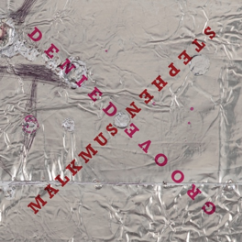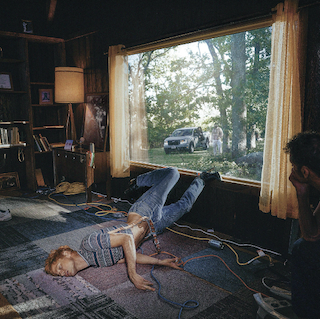“An exciting left-turn into weirdo pop heaven” –Rolling Stone on Malkmus In-The Studio
“A synth-laden, warped experiment drawing influence from early eighties post punk” –NPR on the previously released “Viktor Borgia”
“Elder statesman of slack joins a rather elite club of rockers who forwent their guitars to instead indulge in electronics” –Vulture on rock musicians going electronic
Credit: Robbie Augspurger
Stephen Malkmus had a vision… or so begins the lyrics to ‘Rushing The Acid Frat,’ the newly released single from his forthcoming Groove Denied (out March 15th on Matador Records). The song title, inspired by Stephen’s memories of a specific student fraternity (think less beer-pong-bros, more “Grateful Dead druggy tie-dye” vibe) at his University of Virginia alma mater, is a “Louie Louie”-style shindig rumpus, which he imagines as the soundtrack to a “Star Wars bar scene in such a frat … it’s kinda 12-bar but gigged with psych lyrics.”
Its accompanying video, created by Robert Strange, the visual artist of pop collective Superorganism, features an animated Stephen taking a trippy romp through LA’s Koreatown and Hollywood Forever Cemetery, followed by a trip to the moon, and back to a field on Earth, tinged with colourful hallucinatory enhancements.
Watch the video for ‘Rushing the Acid Frat’ below.
When Stephen Malkmus first arrived on the scene in the early Nineties, as frontman and prime creative force in Pavement, the area of music with which he was associated couldn’t really have been further from the techno-rave sounds of the day. Electronic dance music, then as now, was about posthuman precision, inorganic textures, and hyper-digital clarity. Whereas the lo-fi movement in underground rock championed a messthetic of sloppiness, rough edges, and raw warmth – a hundred exquisitely subtle shades of distortion and abrasion.
Fast forward to the present and here comes Malkmus with Groove Denied – Stephen’s first solo album without his cohorts the Jicks since 2001. Made using Ableton’s Live, instead of a human-powered rhythm section, Malkmus’s arsenal further included drum machines, along with a host of plug-in FX and “soft synths.” He compares the process of track-construction to the way his kids “used to make these girls on my iPhone – choosing hair colour, dresses, etc. That intuitive swipe and grab thing. Chop and move the waves. Apple computer scroll style of thinking.”
This departure from the tried-and-tested stems back to earlier in this decade, when Malkmus spent a couple of years living in Berlin and was exposed to the city’s vibrant club scene. Back in the Nineties, Stephen had given rave culture a wide berth, in part because of bad personal associations with the drug MDMA (he’d had “a really really bad trip” on Ecstasy in 1987, bizarrely on a visit to New York to see Miles Davis perform). But in Berlin, thanks to a younger deejay friend, Malkmus made forays into the city’s world-famous all-night party scene and became fascinated by techno. “The music can be great… you can zone out, dance, and focus on music – or just get wasted!”
It would not be entirely off-base, or an overly cute rock-historical reference, to describe Groove Denied as Stephen Malkmus’s Low. Although largely recorded in Oregon, the bulk of the album was written while he was living in Berlin. And whilst the methodology behind Groove Denied is absolutely 21st Century, the reference points for the sound-palette hark back to the pre-digital era. “The electronic music side of the album, I wanted it to be sonically pre-Internet,” explains Stephen.
Groove Denied will shake up settled notions of what Malkmus is about and what he’s capable of, repositioning him in the scheme of things. But looking at it from a different angle, his engagement with state-of-art digital tech actually makes perfect sense. After all, Nineties lo-fi – the sound in which he and Pavement were initially vaunted as leaders and pioneers – was nothing if not insistently sonic – it was all about the grain of guitar textures, about gratuitously over-done treatments and ear-grabbing effects. Noise for noise’s sake.
As Stephen tweeted recently on the subject of Auto-Tune’s omnipresence in contemporary music-making: “We long 4 transformation….and we humans fucking luv tools.”









